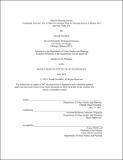Data for Housing Justice: Examining Activists’ Use of Open Government Data for Housing Justice in Boston, MA and New York, NY
Author(s)
Navalkha, Chenab
DownloadThesis PDF (3.716Mb)
Advisor
D’Ignazio, Catherine
Terms of use
Metadata
Show full item recordAbstract
Over the past decade, governments the world over have expanded access to public data through open government data (OGD) portals, from the local to national levels. The Organization for Economic Cooperation and Development describes OGD as a philosophy and a set of politics that aims to serve three social, political, and economic ends: transparency, accountability and value creation. Despite governmental efforts to make data public, research shows that OGD is underutilized and that little is known about citizens’ preferences and interests in utilizing these data. In the U.S., a recent study of a grassroots organization focused on affordable housing described a case of resident-initiated data collection to counteract misrepresentations and misalignments of the local municipal data. Given this disjuncture between the data needs of grassroots actors and the data provided by OGD systems, my study focuses on understanding how local activists negotiate limitations of public data and develop strategies to collect the information they need in their broader campaigns for housing justice. Applying theories of data feminism and insurgent planning, I analyze data practices of housing data activists in Boston and New York City. Through their activities, housing data activists act as data intermediaries who bridge the gap between OGD systems and residents and community organizers. In doing so, they not only facilitate local government’s fulfillment of its goals of transparency and accountability, but also pursue a more liberatory and justice-oriented future for communities facing the threat of displacement. Housing ‘data activists’ utilize a data justice approach that relates historical and contextual analysis of structural oppression to the contemporary geography of the eviction crisis, and proactively counters parallel data practices within the real estate industry to facilitate tenant management and real estate speculation. I argue that OGD systems represent a new opportunity for government officials to take action in order to redress the long-standing power differentials between local tenants and organizers and the real estate industry. If government officials take seriously the values of transparency and accountability, they must take cues from the housing data activists in redesigning OGD systems in such a way that privileges and facilitates use by local residents over use by real estate firms.
Date issued
2021-06Department
Massachusetts Institute of Technology. Department of Urban Studies and PlanningPublisher
Massachusetts Institute of Technology